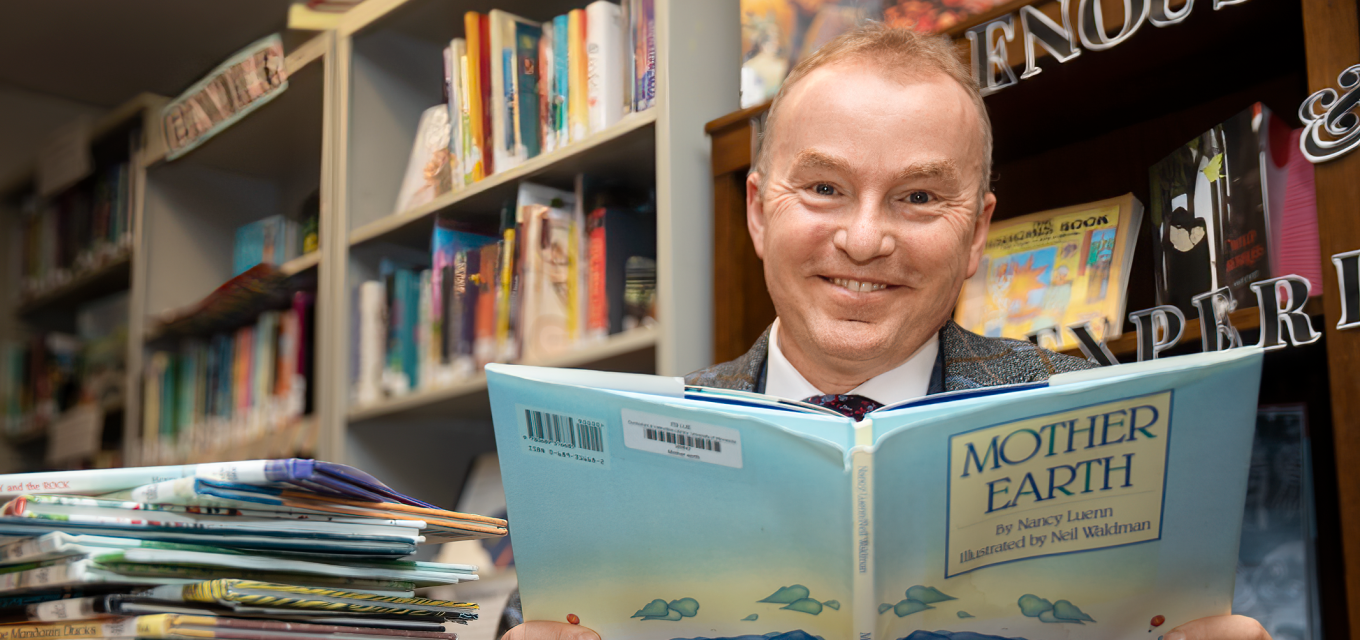2022 Fall

Climate curriculum
New Center for Climate Literacy aims to change attitudes through storytelling.
Climate Change may well be the defining issue of our time. From more extreme weather events to an increase in vector-borne diseases, decreasing food security, and ecological collapse, climate change touches everyone’s life. The next generation will feel the greatest effects as climate change accelerates over time. Department of Curriculum and Instruction Professor Marek Oziewicz wants to give youth the information and tools they need to rewrite the future of climate change and their world through the Center for Climate Literacy.
Oziewicz defines climate literacy as “an understanding of climate change that includes facts and numbers, but centers developing attitudes and values to respect our planetary home.”
The need for the center arose based on the insight that climate change is less of a challenge to technology than a social and cultural challenge to change how we think about our interaction with the earth’s resources and other inhabitants. Oziewicz thinks the best way to change attitudes is not through science but through storytelling. “We are hardwired as humans to think through stories,” he says. “Stories are the starting point of change.”
The Center for Climate Literacy is compiling a searchable database of children’s and young adult literature focused on environmental themes along with resources for K-12 educators to use in their lesson planning. It is also going one step further and piloting a program this fall with local teachers to develop a curriculum focused on climate literacy that they will implement in their classrooms in the spring. The end goal is to design useful teaching materials for both K-12 and informal education spaces that educators can access through a journal on Climate Literacy in Education that will be published by the University of Minnesota Libraries.
The Center is focused on storytelling for children and young adults because they are poised to bear the brunt of climate change; they have the most at stake. Plus, schools also offer an opportunity to reach millions of people in just the K-12 audience. “Over 80 percent of parents want children to learn, and 86 percent of teachers want to teach about climate change,” Oziewicz says as he rattles off numbers that helped guide the center. “Even if you reach five percent of children, that’s a huge impact. They go back to their families and they become advocates and educators.”
The Center for Climate Literacy team includes “climate ambassadors,” or storytellers—authors, illustrators, filmmakers—whose work centers on environmental themes. Most of the current ambassadors are children’s authors, which makes sense given the audience for the Center for Climate Literacy.
One climate ambassador is Katherine Applegate, an award-winning young adult novelist whose books explore the interaction between people and animals. After working with Oziewicz, she started to view her writing differently, as part of a bigger genre shaping children’s perspectives on their future given the effects of climate change. “In the last five to 10 years, it feels like everything you touch on includes the theme of climate change,” she says.
“When I work with children to create stories, I tell them: Find something that’s making you furious and focus on that,” says Applegate. “Someone once told me that good fiction is people misbehaving. A lot of misbehaving that happens in climate fiction takes the shape of kids fighting the status quo. It’s one of the major takeaways kids can pick up from stories on climate
change. It’s okay to be angry about this.”
Oziewicz and his colleagues at the Center for Climate Literacy are at the early stages of channeling their energies toward changing attitudes about climate change. There are a series of climate literacy workshops being developed for the fall, as well as the climate literacy curriculum pilot program and the launch of the journal to plan. Authors, graduates students, researchers, educators, and activists are all welcome to join and fight to change the narrative about our future with climate change one story at a time.
-KAT SILVERSTEIN